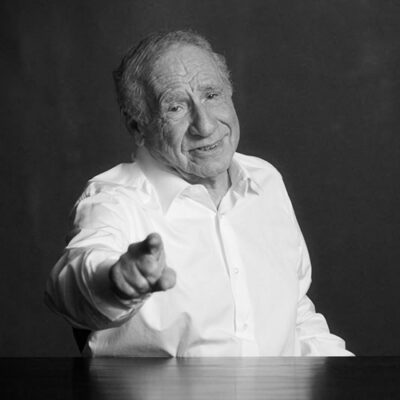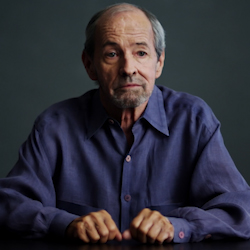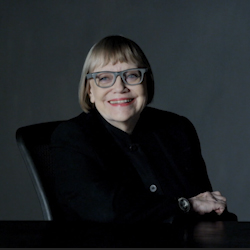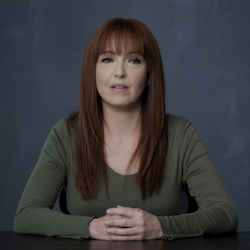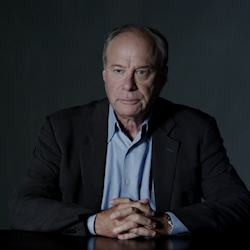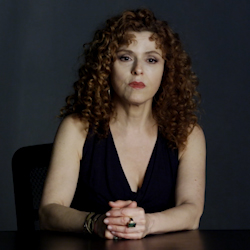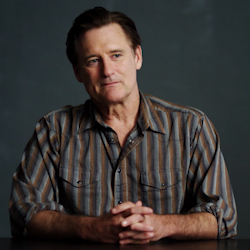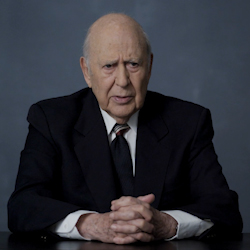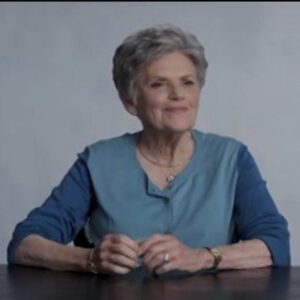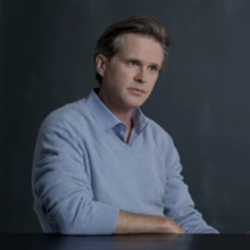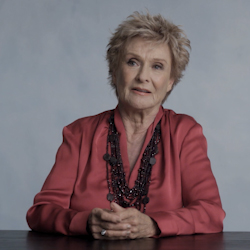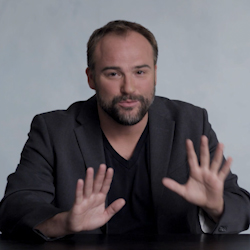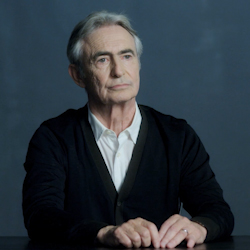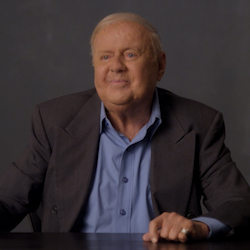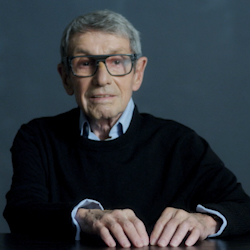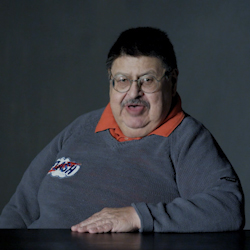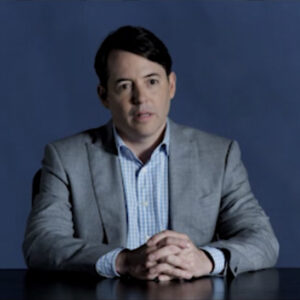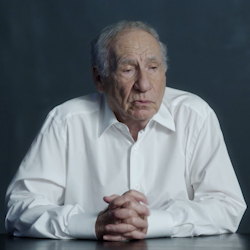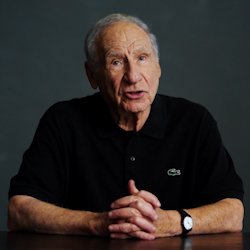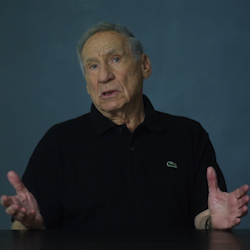Interviewer: Barry, how did you come to work with Mel?
Barry Levinson: It was interesting how it came about the first time that we that we met because I got a call, I was working on The Carol Burnett Show with Rudy DeLuca, who was my partner, and I got a call from Ron Clark, who was a producer who gave us our first jobs in network television. And he did a show called The Tim Conway Show. And he said, I’m going to meet with Mel today. I said Mel Brooks? He said, yeah, I’m going to meet with Mel Brooks. And he said, I have an idea for a movie. And if he likes it, I’d like you guys to come into it also. And I said, OK. And afterwards, when I hung up, I said to Rudy, I mean, what’s he odds that he’s going to meet with Mel? And Mel is going to say, yeah, sure, let’s do that movie. And literally an hour and a half later, he called in and said, Mel loves the idea. He’s liked to meet your guys tomorrow. And we had that meeting and we signed on to do the writing.
Interviewer: Oh, gosh. Well, how did that happen? Oh, boy. Gabriel! Honestly. Yes, because I think we’d stepped on the last part of your story. So would mind picking up with what were the odds that Mel would. I’m sorry. It wont happen again.
Barry Levinson: I said, you know, but you know, what would be the odds of that would that could happen in about an hour and a half later, we got a call from Ron and he said, Mel loves the idea and would like to meet you guys tomorrow. And we went and we met. And that was the beginning of us starting to work on Silent Movie.
Interviewer: So it was that first meeting. I’m going off topic here, but what does that first meeting like?
Barry Levinson: I you know, it’s funny, I can’t remember it that well, because it was Mel Brooks and you have to you have to understand this. I had always listened to the 2000 year old man, and I was you know, I thought he was like, extraordinary, like it was so influential. I mean, the work that he had done with Carl Reiner on that. And then, you know, the producers. And so the idea of suddenly sitting next to him and the possibility of of writing a film was like really kind of overwhelming. And he was amazingly funny, just talking just about whatever it was. I mean, he just was funny, really funny. So the idea that we were gonna work on this project, which was a real departure for him because this was silent movie, which means there wouldn’t he wouldn’t be talking. There wouldn’t be any dialogue. It is just literally a visual piece, which was a challenge in itself. And and it was a really positive and influential period in my life.
Interviewer: Well, he said that doing silent movie was a lot harder than he had anticipated because of the lack of dialogue. And he thought that it would be freeing, that it turned out not to be. So what can you just talk a little bit more about that process? And I mean, it’s kind of obvious why it would be difficult, but how did you how did you and he deal with it?
Barry Levinson: Well, I mean. You know, to right, you know, to write physical comedy is extraordinarily difficult because the guys who did it back in the day, Buster Keaton and Chaplin, they didn’t write out every little thing. No, Sarah, I’m going to do this thing here with the, you know, the escalator and I’m going to run up and down or whatever. And it was literally a hand to mouth. But here we’re like writing, saying. And Mel, fun steps to his left and his so and so grabs his arm, which makes him turn around. You know, you’re trying to explain the whole physical joke. And it was it was exhausting to try to do that. At the same time, you realize, you know, physically how difficult physical comedy is. Now, Rudy and I did a lot of physical comedy because we worked with Marty Feldman in the early 70s. And so we had done a lot of physical comedy. But it is very, very difficult because all these little things have to kind of work in a certain way, if there’s a real choreography to it and and, you know, we’re suddenly thrown into the past in a way because we’re now trying to replicate what the the silent, you know, comedians did back in the 20s. And you can appreciate how difficult a task that that truly is. And it was very difficult for Mel who extremely verbal. I mean, you know, it’s just his language and the way that he talks and everything else. Now you say, okay, now this is this is Mel Brooks, silent Mel Brooks. And that was that was a real period when we would meet every morning for breakfast. Then we would go to the office and we work until lunch and then we would have lunch and then we would sort of, you know, take off. And so we did that every day, actually, for two movies, Silent Movie and High Anxiety. So it was a three year period of of working together closely for that period of time. So it was for me, a great period. And I was look at it as like sort of going to the University of Mel Brooks film school because he included us in every facet of the filmmaking. So we were there all during the writing. We were there when it was being cast. We were there on the set when it was being shot. We were around during the editing process. So we followed all of it all the way through. So two movies in a row over a three year period. I was able to to see it and how it all goes together and the mechanics of it, etc. and then you begin to, you know, develop how you might want to approach it if you were doing a film.
Interviewer: Where where were you at that point in your own career? You hadn’t directed a movie yet?
Barry Levinson: No, no. At that point, I was basically doing a variety, Carol Burnett Show, Marty Feldman before that and and other variety shows. And so that’s basically where I had been working. And so this was the first endeavor into sort of, you know, into into feature filmmaking. And then ultimately that was it period, which I say was really a learning curve. And then I mean, it was to what would happen if I could step out from that. And I’ve always said I mean, Mel was very influential because he was the first person who said to me when I used to talk about diner, I said, talk, tell stories about guys that I knew and you know, and he would say, you know, you should write. You should write about that. You should do a film that should be your film. You should do diner. And so that was the beginning of, oh, let me think. How would that what would I do if I did that? So I began to at least think in that area.
Interviewer: So, I mean, you’ve already answered the next three questions, so I’m not going to go back. But if you could talk a little bit more specifically about what you’ve learned from Mel. You know what specifically you learned from him?
Barry Levinson: Well, you know, it’s hard to say specifically what what did you learn? There’s a look for all the madness of it. And it’s as wild as he can be. And this crazy as he can be, there’s a real discipline to it. You know, here’s what you need to do here. This and this. And this and this. So I was able to observe and participate in all of those facets, you know, from every setup that went on in the course of the day and how editing was going to take place and how the scoring would take place, because you’re watching it firsthand. And and to be involved in that in that concentrated period of three year period was very influential. Now, you ultimately develop your own way of how you might do it, because Mel has this, you know, with specificity to how he approaches it. And then you begin to see things slightly differently. And that that’s part of that kind of growth period. But it was what I admired about him is he he had very specific ideas about what he wanted, but he was open enough to listen and to discuss. And at the same time, to include you that you begin to see it all. And so if there were discussions about a lot of things over those years about how things work or what doesn’t work and just the nature of the stamina that’s necessary for filmmaking, because it is it is it is this constant day after day for 50 or 60 days, you know, to do a film and what’s necessary and how easy it is to drop the ball on any given day and suddenly you’re off course.
Interviewer: Well, he is very disciplined and I think he knows when he’s going after. But does he remain funny on the set when he’s directing a movie?
Barry Levinson: I mean. I mean. You can’t be funny all the time, and that’s not it. But he is he is at times maybe the funniest person I’ve ever come in contact with, even sometimes when he was angry about something or really frustrated that something wasn’t working right or that they’re going to begin to go into overtime. Sometimes he would go into this into a tirade about that. They’re going to have to go into, you know, overtime and things. And he would just go off for like five minutes. It literally you’d have to hold your stomach because he could be that that funny in out of his own rage, you know, I mean, that’s what used to kill me because he could go with this tirade about something that was so funny that it it defies imagination.
Interviewer: Well, I’ve had several meetings with him. And I have I have to say, I would come back each time and I’d say this is gonna be the most fun film in the whole world because I just love being in his company. I laughed the entire time I was in his office. The entire time.
Barry Levinson: He was. I remember when he when we did High Anxiety and he sang the song, you know, High Anxiety and with that kind of Sinatras type of thing. And he had. He wanted to get nominated for best song. So he can go to the Academy Awards in a tuxedo and do as Sinatra esque thing. You know, for, you know, best song. It didn’t get nominated. And he went on to a thing about not getting nominated for that song. That was priceless. I can’t even remember what what he was saying. But it his his frustration and anger was translated into into a humor that just put me away completely.
Interviewer: So this day you brought up, High Anxiety. Did you have to. How did you get up to speed on Hitchcock for that? Did you watch all the movies again? Were you pretty well versed already for High Anxiety?
Barry Levinson: We saw every Hitchcock film. You know, once we had seen before just to look at him again in terms of how how to play with it and the visual aspects of that he was working with or some of the, you know, structure that he was using. So we we watched all of them, some that I hadn’t seen at that point in time. And you would look at some of the some of the things he was doing to be, again, to get up to speed as to how we might construct the piece.
Interviewer: Okay.
Barry Levinson: So we were able to make fun of a certain kind of, you know, visual setups he had, how his camera was moving, etc. And so we were able to play with a film language as a joke, as well as some of the, you know, character and plot points.
Interviewer: So how did you come to do the have the cameo in the shower scene?
Barry Levinson: I’m not I’m not 100 percent sure. I think I was. I think I was making fun of the shower scene in terms of Bernard Hermann’s music, which had that ha ha ha ha. That kind of shrieking sound that I think I would I was making fun of it. And somehow it became my ha ha ha out of it. And Mel said, if we do this, you’ve got to do it. That’s totally insane. That’s that’s insane. And that’s sort of how that evolved.
Interviewer: Oh, that’s hysterical. Did you by any chance ever meet Saul Bass?
Barry Levinson: No.
Interviewer: Do you know. I don’t know whether it’s apocryphal or not, that Saul designed the whole shower scene for Hitchcock.
Barry Levinson: In terms of all of the setups for it?
Interviewer: Yeah, everything. The whole the whole choreography of it. The whole thing.
Barry Levinson: No, I didn’t. I had not heard that at the time. I’ve heard that since. But I didn’t know at the time. What I knew was Hitchcock decided to do the movie in black and white because he couldn’t picture red blood going down the drain. That’s that was the story that I had heard.
Interviewer: That’s interesting. That’s interesting. Were you on the set when Mel was directing Sid Caesar scenes? I mean, do you do you recall anything about their process of working together?
Barry Levinson: You know, the one moment that I remember, I mean, because it in Silent Movie. Which is a fun kind of visual sequence. But the one moment that I remembered, which is in that part of the filming because, you know, I I was so taken with Caesar and his show as a kid, you know, that that show truly made me laugh. And here was Mel as one of the writers, you know, who’s now directing. And there’s Sid Caesar, who is like, you know, a legend. And he was in a hospital bed. And at that time, Sid Caesar was having problems with his back. So to be in a hospital bed was actually sort of relaxing for him. And the only thing that I remember, and that is when they they called break for lunch, everyone left and Caesar said, I like I’ll stay here and everybody left. And I was just watching, you know, Sid Caesar lying in a hospital bed. You know, kind of dozing off in an empty studio. And I remember the moment of watching that as being such a such an odd, you know, strange kind of like for me, almost, no emotional moment of this kind of comedic legend in a hospital bed in a studio where everyone’s disappeared for lunch.
Interviewer: That is an incredible image. All right, I’m just going in order here. Robert obviously has very specific things he’s looking for, but he said, can you talk about the lobster sequence that was cut? Even Mel has admitted in interviews how funny he thought that was until he saw the audience reaction and previews. So what happened there? Did he did and did he agree to remove? He removed it right? So tell us about that story.
Barry Levinson: The lobster, as I remember the lobster sequence watch, which was you go just to Shay lobster or something like that. And as you go in there, the maitre d is a lobster. And, you know, it was like, you know, for two, you know, there’s a claw and everybody is all the all the everyone there is like, you know, lobsters, you know, dressed up very in tuxedos and things. And in the tanks are are people swimming in the tanks of which you’re going to pick out people to have for dinner and which we thought was maybe truly hysterical. And in fact, when we shot it, we thought it was absolutely hysterical that the lobsters are dressed up and the people are swimming in the tank trying to get away from being plucked out of the water. And we don’t. We thought it was very funny. And at the time we were shooting, it was funny. And then they showed it to an audience in the audience who, like, stared at it like, oh, my God, there was not a laugh, as I remember. And I mean, we all remember afterwards about, gee, why that seemed so funny and didn’t work. And then it was it was out of the movie, but it was such an audaciously crazy piece that it to lay there with literally like shock on the faces of the screening audience was a rude awakening.
Interviewer: It’s interesting, though, because it sounds like a comedic Twilight Zone episode.
Barry Levinson: Yes.
Interviewer: Where thing ou know, Rod Serling was always turning it, you know.
Barry Levinson: But the movie wasn’t a twilight zone.
Interviewer: But people accepted this and Twilight Zone.
Barry Levinson: So the difference between, you know, you know, watching something is the Twilight Zone and going, oh, that’s interesting. Or watching something that’s supposed to be humorous and going Mm hmm. That’s frightening. And so I think that’s sort of the way it registered. But but but it stayed with us. We’ve always talked about the lobster scene and that that didn’t work.
Interviewer: I wonder if it still exists.
Barry Levinson: It’ll be a good question. I would love to see it to see if how how wrong we were.
Interviewer: I should’ve asked Robert.
Barry Levinson: Or over time it’s gotten better.
Interviewer: Well, I just got back from vacation about an hour ago, so I’ve got these questions last night. I haven’t had a chance to talk to Robert, but maybe he’s found it. Which is why he wants this story. I don’t know.
Barry Levinson: Maybe.
Interviewer: That would be funny, wouldn’t it?
Barry Levinson: That would be. I’d love to see it.
Interviewer: So what would the writing sessions like for High Anxiety? Did any of you specialize? Were you reloading? Yeah. Just think about it. By the way, let me taste something. I’m going to give you something before you leave, which I think you might enjoy. We did a we did a film on many, many, many years ago. We did a three hour thing on Chaplin called Unknown Chaplin. And we found while we were making the film because, you know, his studio had burned a couple times, so people there was a lot of missing stuff and. We were Oona Chaplin’s one day and she said, oh, there’s this box, I have no idea what it is, you might want to take a look at it. And it turned out to be the outtakes. Because he rehearsed on film.
Barry Levinson: Yes. I think I saw the show.
Interviewer: You’ve seen it?
Barry Levinson: Because it’ll see take number 28. Take 1. 103 or whatever. I mean, the one with all these things, all these.
Interviewer: And Kevin Brownlow is the director.
Barry Levinson: Yeah.
Interviewer: And he was able through this to literally get inside Chaplin’s mind and how he created a sight gag, what didn’t work, what he rejected. It was amazing film.
Barry Levinson: No, I saw that, which was really extraordinary because I think at some point he changed the entire scene.
Interviewer: They’re all 4 endings to City Lights. Different endings.
Barry Levinson: He changed the. I think it was one place and he changed it to something else. So he just kept trying to work the joke. That’s why that’s why silent movie was so difficult, because the business had changed in a way that you no longer could do what Chaplin. How they did it because he knew what he wanted to do or Keaton. They know what they wanted to do. They didn’t write it with light. And so and so as he lifts his hand, it touches the soul. And so and so, you know, we’re like trying to write that out to make it sound interesting to read was an exhausting experience. It was really, really difficult. And I think I don’t think people realize how difficult a silent movie really was to do, because you have to you have to bring the audience along in terms of its plot. And then you have to be able to set up a sequence and set up the thing so that you can get to the the humor of the physicality of it. You just can’t have this physical thing without without some kind. Something that’s holding it together. So it was very complicated to do.
Interviewer: Well you guys did a brilliant job. So high anxiety. What were the writing sessions like on High Anxiety? And did any of you specialize in one specific character?
Barry Levinson: No, I think it was just a free for all. You would just suddenly throw out different ideas and be one of the big things about writing comedy is that you have to everybody has to be comfortable to say things that are not funny. And Mel was great at that because you say, well, what about the guy, does it so-and-so doesn’t work as opposed to you would be afraid to say something that doesn’t work. And so or if that doesn’t work, that someone said, well, yeah, but maybe this and then maybe that or what about. And so you have to and that’s where I think Mel was so great with us in that we would build on things we would build until we could find, you know, the moments that that that’s a really strong moment. And the one thing I always sort of regretted it because I used to have a tape recorder and when we went and when we met for breakfast, I used to tape everything at breakfast and see if there was something would come up. And of course, it was always about everything else, about ordering food and this and that and whatever and all the other stuff, which was really like funny. But if it didn’t apply to the piece I used to like erase it record over it. And now I keep thinking, my God, I got ahead, had like a year and a half of Mel Brooks at breakfast and just would have had something that really hit with a really would have been incredible. But, you know, you’re just focusing on on the work and not in a sense of archival. It would be great to have had that a year and a half of Mel Brooks having breakfast.
Interviewer: I couldn’t agree more. How thoughtless of you. You didn’t know we’re going to make this movie. I don’t envy you. Did you see our Lennon NYC documentary that we did for his 70th birthday?
Barry Levinson: Yes.
Interviewer: So you might not remember this, but in the studio they had. Everything was might all the time. They were like every place except the bathroom. And all of and Lenin didn’t just kind of forgot. And so all of that audio was made available to us, which is why we have him ordering lunch, sushi, sushi all around. That’s how we start the movie.
Barry Levinson: No it’s great. All those little kinds of moments that are that become very special.
Interviewer: Anyway, I don’t quite understand this question, but so maybe I should know, who else were the fellow writers? Were you intimidated at first by being in the writers room, given the legend in history of your show of shows, writers room? Were there what what was this writer group that you were?
Barry Levinson: Well, there was there was a Ron Clark. Rudy de Luca and me and of course, Mel, there were four of us. And for the three years we did the two movies together and we said it, you know, as I said, breakfast together in the deli. And then we would sit at this roundtable in his office and right until, you know, lunchtime. And as I said, you know, you can’t be intimidated because if you’re intimidated, you can’t write or come up with ideas. And that was that was one of the great things about Mel, is that he had done all of these things of which at that point in time, I hadn’t done much at all. But if it was a good moment, if it was funny, it’s funny. And it was open and it was free. And you could say anything and try anything. And you didn’t. You weren’t afraid to say something that didn’t work well. And that’s when comedy is at its best in terms of a group, because things will just happen from it that you just literally laugh. And because it’s it’s a funny joke. It’s a great set up, etc.. And then that’s how you’d work because you’d say, well, then how about if if we’re going to do the scene and then we’re outside on the patio looking through, you know, the you know, the French doors and the camera is creeping in because that’s what you would see in that type of movie. And it creeps in and it creeps and it goes too far and it breaks the window pane. And then just quietly just go and then you’re back up the camera. So it’s just a visual joke. And, you know, however that comes about and then. Well, that’s that’s funny. Let’s put that in or up. Right. And then you just move on to the next thing. To the next thing. And you just progressed that way.
Interviewer: So are there. This is not a question on here. I’m just curious. Are there some days where, like, OK, you know, there are better days and other days, some days the muse just doesn’t strike. Are there days that don’t work?
Barry Levinson: I don’t remember things not working for an entire day, but there has to be there has to be there are just times when things just aren’t clicking. And there are times when all of a sudden there’s just one thing after another that just just sails along and it seems as simple as it can be. And it’s it’s elusive in terms of how do you get to comedy because you. It’s that extra step. You said already comes into the room and then this and this. And then what? What makes something funny? You know, there’s some you know, there has to be something that sets it off. What that is, is is the magic of comedy. And I don’t think anybody said, well, if you do this and do this, therefore you will have the joke. It doesn’t work that way. It is. It is elusive. And it is it it’s very special. And it’s the most complicated. It is the most complicated form to work in, I think, because, you know, you can you can write a dramatic scene. You know, that that can fall into place and it can be good. And and comedy requires something else on top of it that somehow spins it, that you’re just enjoying the moment. And then there’s a there’s a laugh to it as well. It’s very elusive. Because all you have to do is if you it could be funny on the page. We’re talking about it could be funny on the page. And then you can get to the soundstage and suddenly it’s not funny. And then you have to figure out what what is the problem? Why is it not funny? And then sometimes you can make a slight adjustment and all of a sudden it it’s alive again. And comedy is extremely fragile. And I think Mel is great at it and carrying it along from A to B to C to hold onto it all the time, because it’s it’s so delicate. And it was very good at it. . As they say, carrying that carrying that comedy, you know, from the beginning until the end. So you don’t just suddenly lose it along the way.
Interviewer: Terrific. That’s great. So you were writing for Cloris Leachman. How much of what you wrote for her ended up on the screen and how much of it was her own doing?
Barry Levinson: I don’t know, I can’t I can’t answer as to, you know, it’s what happens is it all becomes a blur because what you do is you you do the writing and then you’re there when it’s being shot and whatever adjustments that may happen, happen. And it’s very hard to kind of separate one from another. It’s like sometimes if a group of writers are really working well together, it’s hard to remember who wrote what. You know, because if you were to ask me, so which jokes were the ones you wrote, I literally can’t tell you and I cannot. There might be a moment here or there. You say, I remember, you know. You know, Rudy said that which was great or what. I’m very vague, but otherwise it’s just became a unit. And it’s the same thing when you’re shooting it. There might be a moment here and there, but basically it’s just all an extension of this, of the material it was written. And then when you’re on the floor and it’s being shot and I can’t really remember what was written and what gets made up? I don’t remember enormous amount of ad libbing in them in those in those two films we did together.
Interviewer: Well, that’s interesting. That’s something I’d be curious about. Because you you get the feeling that maybe that would have happened more. You know, everybody just sort of in the moment making stuff up.
Barry Levinson: Yeah. Well, I think with I think the best part of is that if it feels like it’s made up, then it’s it’s at its best. And I but I don’t remember enormous amount of ad libbing. I’m sure there were, you know, lines and things that somehow, you know, worked their way into the into the final cut. But I don’t remember it as being a time of of a lot of improvisation.
Interviewer: You know, we did a film on Carol Burnett. I dont know if you saw it. But it seems to me that there was some ad libbing on Carol Burnett. Fair amount of that, wasn’t there or not?
Barry Levinson: Well, it was it would be Tim Conway who would do that, would instigate that. And and Tim was very good because, as I said, we started writing for him when he had his own variety show. And then when he went to Carol Burnett, we were on The Carol Burnett Show. But so we wrote a lot of his physical stuff. And he would sometimes he would I remember being in the studio one time and he was going over to the door and he was holding on the door and he was etc. and he was playing around with and what he was doing to see how strong the door was and whatever. And when they they came time to shoot. He took what was written there and then he expanded on it. But he knew what he could play with in terms of that door and how he can fiddle with it. And he would do that. And sometimes he would he would take it a little further. And, you know, Carol would try. Carol always tried not to laugh. Harvey would fall apart. But Carol would try not to laugh.
Interviewer: We have some of those scenes in the film. So Mel never seems interested in daily concerns in his comedy. Children, marriage, career, etc. Seems to all be grounded in history and literature. Would you agree with that?
Barry Levinson: That seems to be that seems to be the case more more than not. If I were to try to think about, you know, whereas his interests lie, you know, I think they’re in bigger topics at times like greed, you know, might be what he would like to work on, just that topic, greed or this and those particular kind of areas. And and his his approach to comedy. Is it you know, sometimes it could be a, you know, like a little laugh or whatever. Mel was not interested in a little laugh. He was he literally wanted you to, like, collapse and fall on the ground and can’t breathe. That that’s the moment of comedy that he would like, that you’re like choking to death. You could die because you’re laughing so hard. So it was literally we got to remember. It’s like, oh, it just got to just the attack you in that that that’s the way he would he would approach, you know, you know, comedy like a little laugh is like hahaha. He was not interested in a little hahaha. He wanted literally to to have you on the ground, you know, doubled up that that’s where he would he would come at it in terms of, you know, to get the laugh.
Interviewer: In all the time you’ve known him, would you say anything has changed or influenced his comic vision?
Barry Levinson: No, I don’t think so. I think he had it look, he had a very defined comedic mind and it is defined in a comedic mind. I mean, that that is the mind of Mel Brooks is what we’ve been seeing now for the past, you know. Fifty years that that Brooks, sonian kind of comedy is where he he lives and breathes and and that is. It’s not. Not many people come along that have sort of defined comedy. And he’s one of them. You know, from I mean, look, if you take the two thousand year old man, you know, did you know what you know, like saying, you know, did you know you, Joan of Arc? And you said, no, I dated her, you know. And that the fact that he can reduce, you know, Joan of Arc with he had dated her, you know, said, you know, we slept together, you know. You know. And, you know, I want to wash up. And she’s gonna go saverance, you know? Right. So he he took this historical thing and reduced it to something so simple in a way which is brilliant. So that that 2000 year old man that he played with. And and then letting it expand into his films, you know, from the producers, which at its time was about as outrageous a, you know, a film that I had ever seen in terms of comedy. And then he went into, you know, Blazing Saddles, which, you know, opened the door for all modern comedy that followed in terms of that for all the years, you know, after that literally, you know, broke all of the boundaries that were in existence at that time.
Interviewer: Can you amplify on that?
Barry Levinson: I mean, if he at that point in time, I don’t think to my recollection and maybe some one else can point to it. It was the first time literally taking a genre apart and and basically, you know, having fun with it. So he took the West and he he you know, that things you saw in the movies of the West that the camp fire and then suddenly they’re eating beans and then all of a sudden, you know, they’re farting. And you’d say, well, I remembers a lot of movies with the meeting there, and you never saw that or or the idea of a black man, you know, who’s now a sheriff and and making fun of those things and and prejudice, etc. And really, you know, going to the to the wall with with that comedy was I don’t know that, you know, maybe somebody say, well, there was so-and-so, I don’t know. But that that was a defining comedy that became influential for the you know, the rest of the 20th century, you know, from that film. You know, Zucker brothers, you know, did things and the parodies, etc., which continue on today. The parody is of various genres. You know, he he he basically, you know, struck upon and. And what was it, 1970 or 71? I can’t remember the exact year.
Interviewer: Well, the concept of The Producers is just. It’s just genius. Yes. To turn it on its ear like that.
Barry Levinson: To have to make fun of, you know. You know, Hitler and springtime for Hitler. I mean, that was pretty, pretty out there. Comedy. I remember seeing it at the time and just going, oh, my God. He’s he’s just, you know, hit this ball out out of beyond the fences in terms of, you know, really going for it and and Gene Wilder and Zero Mostel and the way they talk to one another, you know. It was extraordinary, extraordinary.
Interviewer: I, I remember the first time I saw that movie, I was, like, completely blown away. It’s just the genius of it to take this away. You don’t wanna hear it, I have to say. So what do you think separates male from other comedic writers, filmmakers?
Barry Levinson: It’s a hard question to answer. But, you know, there are a lot of you know. There is a face to Mel Brooks in terms of writer, you know, I mean, because he’s he’s a performer as well. And, you know, so it’s easy to identify, you know, there’s Mel Brooks and then there’s a Mel Brooks comedy, you know, and they’re they’re connected in a way that says that he has an identity, a very specific identity to the kind of movies that he was, you know, that he made. And as they say, they were generally outrageous and, you know. And they were kind of like, you know, go for the throat, you know? Laughter. You know, they were full out. You know, comedies he wasn’t trying to do, you know, a comedic drama or whatever. He was going for the biggest laughs he could possibly deliver. So it’s like swinging for the fences all the time.
Interviewer: I can’t think of anybody else like Mel Brooks. I think you’re right. There’s Mel Brooks. Norman Steinberg said he uses language with great intent. Can you talk about his use of language?
Barry Levinson: Well, I mean, I think that he has. He has a great sense of phrasing and a and and his. I can’t remember the specifics of it, but even in 12 chairs, there’s a moment where they they Mels in there, they wake him up, he’s like a peasant or something, you know? And you know, what happened or whatever, you know? And and he said it’s something like this in his language is better than what I will use because I’m just paraphrasing what he said. You know, there was a noise. It was our racket. There was a racket. And it said, you mean the revolution, because that’s what it was. His idea of reducing like the Russian Revolution to a noise or a racket or something like that. Other words, he reduced it to such a simple word rather than. Well, there was this turmoil and a thing I was it was it was like a racket, a noise. Whatever the specific of it, it was just so ordinary to deal with the idea of the Russian Revolution that it’s that type of phrasing at times that he will have in there. And the end the 2000 year old man, you know what it you know, that will constantly take these words and simple way and play with it.
Interviewer: Now, the question here is, what do you make of his repeated use of Hitler? Now, I only know two. To Have and Have Not the remake or to be or not whatever it was that that that the remake of the.
Barry Levinson: And The Producers.
Interviewer: And the producers, I don’t know if there any others. So I don’t quite understand. The question is, is Hitler referenced in other movies?
Barry Levinson: Not that I know of.
Interviewer: OK, well, let’s ask the question anyway. What do you make of his repeated use of Hitler?
Barry Levinson: Well, let me just say, I only know those two you know, those two pieces where he’s where he’s referenced that. But it ended a totally different way than anyone ever did before, so. But I only know those two in terms of the body of work. It doesn’t seem like much.
Interviewer: Sorry. Can we take a moment to reload? Sure. There’s very few questions left, but yes.
Barry Levinson: For two. I was there also. I didn’t see you.
Interviewer: David Geffen. So we’re not interviewing him. But he tells me that he gave Mel the idea to do a musical out of Producers.
Barry Levinson: Really?
Interviewer: I wouldn’t be surprised, actually, because he was in theater at the time.
Barry Levinson: I mean, when he told me the idea. So what a great ideas is a musical seems fantastic. And at that point, Mel was a little like, I don’t know. I don’t know where, you know, where to go with that, like early on. But I always thought it seems like a great idea.
Interviewer: Now, I think they’re making a musical out of Blazing Saddles.
Barry Levinson: Are they?
Interviewer: I think so. I think I heard that. That’ll be funny.
Barry Levinson: Yeah.
Interviewer: So that may not even be a very good question, but whether there was a before Mel period and after Blazing Saddles and after Mel period. In terms of this kind of a kind of approach to comedy and movies, I think you probably already answered it.
Barry Levinson: Yeah I think i did.
Interviewer: But are there. I mean, who who comes out of the Mel tradition? I mean, he’s so singular. Is there anybody?
Barry Levinson: I don’t know of any. I don’t know. I don’t know of anyone that quite. Was in the zone of Mel Brooks in terms of comedy. I don’t know that’s, you know, I mean, there were different people it’s interesting, there were people that came out of, you know, out of the Cæsar camp. And so you end up with, you know, Woody Allen, who went his own way in terms of his kinds of comedy. Larry Gelbart, you know, another particular way of going, you know, and Mel, in another way, you know, so there was a lot of talent that came out of that Caesar camp and all of them being very different from one another. And, of course, Neil Simon is, you know, another. So there is a lot of different types of humor from that group that that was part of Caesar and they were all very different. And Mel is in some place you know, way over here in terms of the most extravagantly crazy of the group.
Interviewer: So we’re pretty much finished all of Robert’s questions, so let me just ask you a couple of things. Do you have a favorite scene or two that comes to mind when you think about Mel Brooks and you go, Oh my God. That was that was an amazing. I’ll never forget that. I watch it every scene. I look for it every day. Whatever any particular scenes that you could talk about and how and how you feel about them and what strikes you, particularly about them, you don’t have to have one. But I’m just curious.
Barry Levinson: I mean, I think there’s there’s a there’s a whole I mean, I. I remember seeing. When the producers came out and thinking, my God, this thing is so in it, in its own place, you can’t even reference it next to anything else. You know, and the you know, Kenneth Mars on the roof, you know, with is known as the Nazi, you know, was so, so completely, you know, crazy, crazier character. And the dialogue between between Zero Mostel and Gene Wilder is is astoundingly great. You know that the way they work together and all the lines of dialogue and that were fantastic, you know. And not just sort of like naturalistic wit. I mean, totally like crazy people, you know. And get it. And yet it doesn’t fall apart because sometimes you can get very extravagantly crazy characters and it all just falls apart. And here they are maintained, you know, throughout this. You know, this 90 minute movie or whatever, and it and it holds together very, very well, it’s very well, you know, designed and the structure of it and the characters were absolutely amazing. And I think one of the things about Mel is that he’s not afraid. He will literally go for it, you know, because he believes that. And he’ll he’ll like take it as far as you can take something. And that’s a hard thing to do. It’s very easy to pull back. And so I’m just going to be nice over here, will be nice or whatever. He’s literally, you know, as I say, like swinging for the fence with and say, here it is. I’m going all the way with this. No, no, I’m not I’m not holding back. And I think that it that kind of bravery ultimately is. And to succeed at it. Pretty extraordinary. It does not happen very often that someone can truly define a form of comedy.
Interviewer: Did you. Did you ever meet Zero Mostel?
Barry Levinson: No. Wish I did.
Interviewer: Yeah. I’d love to know how he felt that. He brought something very special to that. So did Gene Wilder.
Barry Levinson: Oh, no. Wilder was amazing in that, you know, I mean, you know, I’m in pain. I’m so it’s all wet. Whatever that whole road run that he had to it, you know, you could tell I’m terrible at remembering specific lines. And if I write the line, I can’t remember it, you know, but I can remember them the moments of it. You know.
Interviewer: Well, he played that neurotic as well as anybody’s ever played it.
Barry Levinson: No, it was extraordinary. And he was extraordinary. Gene Wilder was extraordinary in Blazing Saddles. Playing a totally different character, a gunslinger, you know. I mean, extraordinary. I mean, Gene Wilder was the perfect. The perfect person to work with, Mel. Going through to Young Frankenstein. Perfect. He really was able to take, you know, what Mel wrote and create a character that that was an amazing collaboration of of two people.
Interviewer: Did you know him?
Barry Levinson: Yes.
Interviewer: Do you know him? I mean, you’re still around.
Barry Levinson: Yeah.
Interviewer: But apparently not doing very well.
Barry Levinson: That’s what I heard.
Interviewer: Did he ever talk about working with Mel?
Speaker No, because we were always with Mel. So there’s they’re as different as can be. I mean, Mel Brooks and Gene Wilder, you can’t have two people any different than those two. And they were perfect, perfect, you know, to work together.
Interviewer: How were they.
Barry Levinson: Great meeting of two individuals.
Interviewer: How were they different?
Barry Levinson: Well, Gene is much more introspective. Sort of like this quiet romantic. You know, there you could say, like you said, thoughtful, there’s an interior kind of thing going on inside of him, you know. And then Mel is the opposite. You know, it’s like her, like it’s like you’re pushing and going. And here we’re going. And that’s drive it or whatever. I mean, there were they are complete opposites of one another. And then that made for a great, great collaboration.
Interviewer: So one last question. Do you have a favorite anecdote? Or anything you want to say that you haven’t been asked?
Barry Levinson: No. I mean, there were so many things. I mean, I always I you know, I, I remember the fact of and I can’t remember the specific, you know, lines or words that were said, you know, but he was as good as as as to work for someone as possible. I mean, he didn’t it wasn’t like, you know, he was in charge, but and it was his piece. You know, you’re basically serving, you know. You know, Mel, in that regard. But at the same time, you know, he was extremely, like, open to ideas, even if he would get, you know, you know, angry that you would say maybe you should try this while you can. And he would. You know, he would. He would. I remember only one particular time where we would sit by the monitors and because he’s in it. You know, when he does that take. And it was like, all right, we’re going to move on, you know, move on. I walked over to Mel one time and and I said, Mel, maybe you can do if you can. You know, like because we were free to always walk over and say, so maybe you could do the whatever. And all of a sudden he would suddenly goes like, hold it, hold it. We’re not moving on. Barry is not happy. And yet you’re about to go ughh. You know, we’d like that. But, you know, he would go ahead and do something again, you know, in with a slightly different way. And you always felt embarrassed, you know, but you know, you’d whisper those things. But but he appreciated the fact that you can come forward and with a suggestion if he thought it was valid and off, you know. And that was like kind of was, you know, great about him because it was you felt as if you were you were you were doing the work that you can do. And at the same time, the learning experience for me, because that was this concentrated three year period that all of a sudden all these ideas and all these things and look at is doing this and etc, etc.. And then you begin to you’re making your own way of how you might want to do it. But it’s because of his influence and and his support in a way. So it was a you know, you have to say in terms of your life, you say that that was a highlight of three years with a true comedic genius. And they don’t happen often in the comedy world, there are few and far between. And if you say Mel Brooks, you immediately, you know, you can smile and say, yeah.
Interviewer: Excellent. That was also a great imitation of Mel. You’ve mastered that. Thank you very much.
Barry Levinson: You’re welcome.
Interviewer: I’m sure Robert’s going to be very pleased or some great I hope you have a great gems in there.

